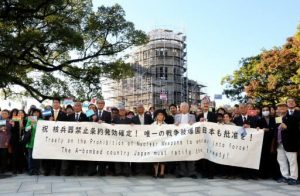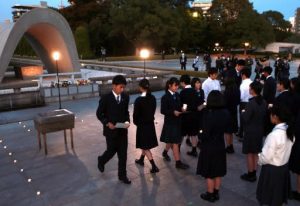TPNW’s entry into force provides ray of hope to Hiroshima’s earnest desire for nuclear abolition: A-bomb survivors vow to continue speaking out
Oct. 26, 2020
by Kyosuke Mizukawa and Shuhei Inomata, Staff Writers
On October 25, the day it was reported that the number of nations and regions ratifying the Treaty on the Prohibition of Nuclear Weapons (TPNW) had reached 50, the number necessary for the treaty to take effect, A-bomb survivors and citizens in the A-bombed city of Hiroshima held gatherings and events at Hiroshima Peace Memorial Park, located in the city’s Naka Ward, to share their joy. Recognizing that the next step will be crucial, they vowed to continue their efforts to call on nuclear nations and the Japanese national government to join the TPNW to ensure that the treaty’s effectuation leads to the elimination of nuclear weapons.
At a gathering held in front of the A-bomb Dome attended by about 170 people, representatives of A-bomb survivors groups as well as Hidehiko Yuzaki, governor of Hiroshima Prefecture, and Kazumi Matsui, mayor of Hiroshima, held up a banner that read, “The only A-bombed country Japan must ratify the treaty!” and waved flags of the 50 nations and regions that had ratified the TPNW treaty.
Toshiyuki Mimaki, 78, acting chair of the Hiroshima Prefectural Confederation of A-bomb Sufferers Organization (Hiroshima Prefectural Hidankyo, chaired by Sunao Tsuboi), grasped the microphone with joy. “I am so happy. This day was truly long in coming.”
When Mr. Mimaki visited the United States in conjunction with a meeting to negotiate establishment of the TPNW at the United Nations in 2017, he brought a list of about three million signatures (at that time) gathered through the Hibakusha Appeal, a signature drive calling for the prohibition and elimination of nuclear weapons. Even after establishment of the treaty in July that year, his group continued to collect signatures on streets and elsewhere to help push for ratification of the treaty.
The ratification by 50 nations and regions took three years and three months to realize. Mr. Mimaki stressed the importance of the role played by citizens in his words, “It’s crucial for us to continue to raise our voices for elimination of nuclear arms,” and implied his frustration over Japan’s reliance on the U.S. nuclear umbrella and the government turning its back on the treaty when he said, “I feel ashamed.”
Kunihiko Sakuma, 76, chair of the other Hiroshima Prefectural Hidankyo, which also collects signatures through the drive, reported that the number of signatures had reached 12,612,798 (as of September 18). He told the participants that they had to “extend our activities ever more to ensure that the treaty’s entry into force leads to the abolition of nuclear arms.”
Haruko Moritaki, 81, co-chair of the citizen’s group Hiroshima Alliance for Nuclear Weapons Abolition (HANWA), touched on the point that the TPNW serves to deny the policy of nuclear deterrence by prohibiting the threat of use of the weapons. “We have gained the biggest and the most powerful tool [for nuclear abolition],” she proclaimed.
In front of the Cenotaph for the A-bomb Victims, 30 young people took part in a gathering held by the Hiroshima Peace Culture Foundation. As 80 candles were lit, the participants read aloud in both Japanese and English their pledge to act to achieve nuclear abolition. Sakura Ito, 15, a first-year student at Eishin Senior High School in the city of Fukuyama, said, “Never forgetting the wishes of victims who rest here and the A-bomb survivors who still suffer, I want to continue taking action.”
At the Rest House, an A-bombed building located in the park, citizens participated in an online event organized by the Peace Boat, a non-governmental organization (NGO) based in Tokyo. A piano played regularly by Akiko Kawamoto, an A-bomb victim who died at the age of 19, was introduced to the participants and everyone’s wishes for a peaceful world were shared.
(Originally published on October 26, 2020)
Responses from Hiroshima citizens and tourists to the nuclear ban treaty’s entry into force next January: “Signs of hope” and “Increase number of participating countries”
On October 25, the day it was reported that the number of nations and regions ratifying the Treaty on the Prohibition of Nuclear Weapons (TPNW) had reached 50, the number necessary for the treaty to take effect, A-bomb survivors and citizens in the A-bombed city of Hiroshima held gatherings and events at Hiroshima Peace Memorial Park, located in the city’s Naka Ward, to share their joy. Recognizing that the next step will be crucial, they vowed to continue their efforts to call on nuclear nations and the Japanese national government to join the TPNW to ensure that the treaty’s effectuation leads to the elimination of nuclear weapons.
At a gathering held in front of the A-bomb Dome attended by about 170 people, representatives of A-bomb survivors groups as well as Hidehiko Yuzaki, governor of Hiroshima Prefecture, and Kazumi Matsui, mayor of Hiroshima, held up a banner that read, “The only A-bombed country Japan must ratify the treaty!” and waved flags of the 50 nations and regions that had ratified the TPNW treaty.
Toshiyuki Mimaki, 78, acting chair of the Hiroshima Prefectural Confederation of A-bomb Sufferers Organization (Hiroshima Prefectural Hidankyo, chaired by Sunao Tsuboi), grasped the microphone with joy. “I am so happy. This day was truly long in coming.”
When Mr. Mimaki visited the United States in conjunction with a meeting to negotiate establishment of the TPNW at the United Nations in 2017, he brought a list of about three million signatures (at that time) gathered through the Hibakusha Appeal, a signature drive calling for the prohibition and elimination of nuclear weapons. Even after establishment of the treaty in July that year, his group continued to collect signatures on streets and elsewhere to help push for ratification of the treaty.
The ratification by 50 nations and regions took three years and three months to realize. Mr. Mimaki stressed the importance of the role played by citizens in his words, “It’s crucial for us to continue to raise our voices for elimination of nuclear arms,” and implied his frustration over Japan’s reliance on the U.S. nuclear umbrella and the government turning its back on the treaty when he said, “I feel ashamed.”
Kunihiko Sakuma, 76, chair of the other Hiroshima Prefectural Hidankyo, which also collects signatures through the drive, reported that the number of signatures had reached 12,612,798 (as of September 18). He told the participants that they had to “extend our activities ever more to ensure that the treaty’s entry into force leads to the abolition of nuclear arms.”
Haruko Moritaki, 81, co-chair of the citizen’s group Hiroshima Alliance for Nuclear Weapons Abolition (HANWA), touched on the point that the TPNW serves to deny the policy of nuclear deterrence by prohibiting the threat of use of the weapons. “We have gained the biggest and the most powerful tool [for nuclear abolition],” she proclaimed.
In front of the Cenotaph for the A-bomb Victims, 30 young people took part in a gathering held by the Hiroshima Peace Culture Foundation. As 80 candles were lit, the participants read aloud in both Japanese and English their pledge to act to achieve nuclear abolition. Sakura Ito, 15, a first-year student at Eishin Senior High School in the city of Fukuyama, said, “Never forgetting the wishes of victims who rest here and the A-bomb survivors who still suffer, I want to continue taking action.”
At the Rest House, an A-bombed building located in the park, citizens participated in an online event organized by the Peace Boat, a non-governmental organization (NGO) based in Tokyo. A piano played regularly by Akiko Kawamoto, an A-bomb victim who died at the age of 19, was introduced to the participants and everyone’s wishes for a peaceful world were shared.
(Originally published on October 26, 2020)
Responses from Hiroshima citizens and tourists to the nuclear ban treaty’s entry into force next January: “Signs of hope” and “Increase number of participating countries”









